We feature some of Theory and Practice in Teacher Education’s (TPTE) faculty, staff, graduate students and alumni who tell us about their impressions of studying and working in TPTE.
TPTE Faculty Spotlights
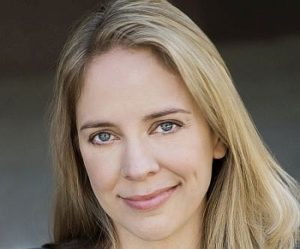 Meet Allison Varnes, clinical assistant professor in English education and urban multicultural education (posted November 1, 2019)
Meet Allison Varnes, clinical assistant professor in English education and urban multicultural education (posted November 1, 2019)
All three of Varnes’ degrees are from the University of Tennessee Knoxville, and it has always been a dream of hers to work here. When opportunity knocked, she jumped at the chance to come home again. Her current role includes working with interns in the English education cohort and the elementary interns in the Urban/Multicultural cohort. She is also part of a team that is working to develop a graduate certificate program in writing children’s and Young Adult (YA) literature.
She loves all aspects of her work in this department. Her two all-time favorite jobs are supervising interns and writing for kids. In her new role, she gets to work with interns and contribute to the development of a potential writing certificate. It’s the best of both worlds!
In addition to her career here, she is also a middle-grade author. Her second novel is coming soon from Random House Children’s Books!
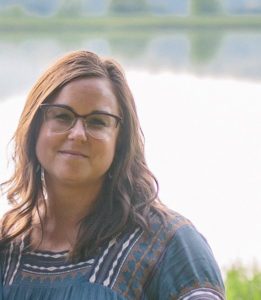 Meet Kelly Wallace, clinical assistant professor of elementary education (posted November 1, 2019)
Meet Kelly Wallace, clinical assistant professor of elementary education (posted November 1, 2019)
The University of Tennessee is Wallace’s home away from home. She spent a collective ten years here as a student, so it was fitting for her to start her higher education career here. Her role includes supporting elementary interns in the urban multicultural cohort.
Currently, she is immersed in learning how to successfully lead the interns through edTPA and learning the nuances of the different schools in which our interns are working. The most enjoyable aspects of her work are observing her students teach in their elementary classrooms and coaching them to be culturally relevant teachers.
One thing people may not know about her is that she is an extremely adventurous. Snowboarding, wakeboarding, and going to outdoor music festivals are among her favorite pastimes.
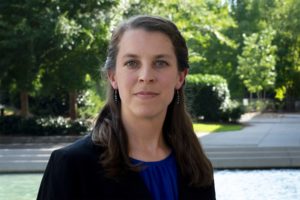 Meet Kristen Secora, assistant professor of communication disorders (posted November 1, 2019)
Meet Kristen Secora, assistant professor of communication disorders (posted November 1, 2019)
Prior to joining the faculty at the University of Tennessee, Knoxville, Secora earned her PhD in Language and Communicative Disorders from San Diego State University / University of California San Diego and then spent three years working as a speech-language pathologist in a public elementary school in California. She worked with children who are deaf and use American Sign Language (ASL) as their primary means of communication. She was struck by the lack of language support and other resources that are available to hearing parents who have deaf, signing children, particularly for Spanish-speaking families. She was also struck by the scarcity of ASL language assessment tools for professionals working with deaf signing children. In coming to UT, she is excited to work with the amazing faculty members who are already involved with improving language and education outcomes for deaf children.
She is the TPTE liaison for the students in the Audiology and Speech Pathology (AUSP) joint undergraduate degree with the University of Tennessee Health Science Center, and is involved with the Deaf Focus and Special Education teams. She has really enjoyed getting to meet the students and faculty here. Everyone has been very welcoming, with great suggestions on local “must-do” activities.
People may not know that her favorite movie is “The Princess Bride.” She thinks it’s one of the best quotable movies of all time and “anyone who says differently is selling something.”
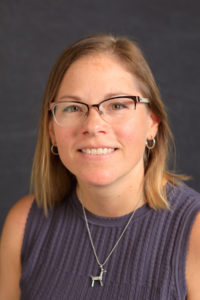 Meet Sherry Jankiewicz, clinical assistant professor of art education (posted November 1, 2019)
Meet Sherry Jankiewicz, clinical assistant professor of art education (posted November 1, 2019)
Jankiewicz had a hunch she would like the state of Tennessee based on her outdoor interests and the inspiring quality of a growing city. Her role in the art education department is to teach the undergraduate courses for our art education minor, to teach the Art Production and Critical Pedagogy course for our graduate students, and to supervise our interns in Knox County. Outside of teaching, she is working on connecting her own art production and research interests to community engagement opportunities. Art is a powerful tool that has the capacity to bring others together.
Her favorite part of being here is setting her own schedule, feeling an independent desire to perform her job well, meeting new people, and making connections with the School of Art. UT has been very welcoming and helpful, and the people of Knoxville are the friendliest she has ever met. In her moments of work / life “harmony”, she has been enjoying the campus pool which reminds her of her childhood swim team days and her camp counselor life-guard training program.
Sherry says, “Starting a new job can feel like you have been pushed off a diving board before you are ready to jump in, and I happily embrace the metaphor and swim.”
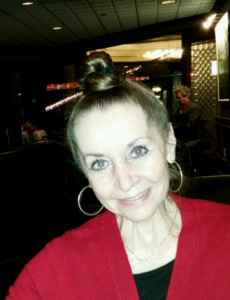
Meet Patricia Davis-Wiley, professor emerita of world language and English as a second language (ESL) (posted June 3, 2019)
Pattie Davis-Wiley, professor of world language and English as a second language (ESL) education, was inducted into the Tennessee Foreign Language Teaching Association’s Hall of Fame at their annual conference in Fall 2018. Her impact on world language education spans the globe. With that honor in mind, we wanted to learn a little more about Professor Davis-Wiley’s background, interests, and professional experiences.
Where did you grow up?
I am a native Southern Californian from an area a little north of San Diego. I completed a bachelor’s degree and master’s degree in French from the University of California.
What led to you a career in your field?
I had originally planned on becoming a marine biologist but, after studying for a year at l’université de Montpellier at La Faculté des Lettres, I returned with enough credits to graduate early with a new major – French – and love of all things Francophile. This led me to pursue a graduate degree in French. I was hired by Baylor University in Waco, Texas to teach French, and ended up quite by accident teaching French and Spanish on the high school level for two years. That experience was followed by another few years of high school teaching in Houston, Texas. I left the classroom to become a tri-lingual assistant to the vice-president of an international oil company for half a year, but was called back to teaching high school for another three or so years. After matriculating in a non-traditional licensure program and earning a second master’s degree, I became a teaching assistant in the College of Education at the University of Houston for a year while working on my doctorate in education. I was then hired as a full-time instructor of world language education while I concurrently completed my doctoral work. Following graduation, I remained as a Visiting Assistant Professor at the University of Houston for one year.
What brought you to the University of Tennessee, Knoxville?
I had no intention of moving east and had actually been offered positions at three other universities to teach in their colleges of education, but someone from the University of Tennessee, Knoxville called me in the early summer of 1980, flew me out for an interview, and le reste c’est l’histoire (“the rest is history”). I had not even applied for a position at UT. My curriculum vitae, however, had been picked up at an American Association of Colleges for Teacher Education (AACTE) conference where I had interviewed and been passed on to someone at UT. My brother and sister-in-law, who were both medical school graduates from Vanderbilt University and who are in practice in Nashville, were ecstatic to have me move to Knoxville.
What are your roles within TPTE and the College of Education, Health and Human Sciences (CEHHS)?
Over the years, from 1980 to present, my roles have been many and quite varied. They have included: expanding the world language education program, initiating the ESL beginning licensure and graduate programs, and directing the first alternative licensure program in our college called the Lynhurst Program. This model program actually became the pilot licensure program for our present fifth-year internship program. Additionally, I took on college-wide administrative duties, serving as the Unit Leader of Language, Communication, and Humanities Education (art, English, world languages and ESL education) in the new College of Education, Health and Human Sciences, and later functioning as the Director of Summer School for three years for the college. Currently, I have the privilege of coordinating the graduate programs in world language education, the non-licensure program in ESL education, and directing PhD degrees with an ESL specialization.
What are your areas of interest in research?
My research foci have evolved over the decades and have chronologically included empirical research in early language learning; the impact of second language acquisition on academic success; world language study for students receiving special education services; global awareness and inter-cultural competence; using SKYPE, Google Hangouts and Pbworks to create virtual learning communities (VLCs); using Web 2.0 tools in the second language acquisition classroom; the future of world language teacher preparation; and social justice issues with English learners (ELs).
Of what accomplishments are you most proud?
Aside from my research contributions to the field and helping to add the study of English as an integral part of the national K-12 curriculum in South Korea, I feel that my legacy to the profession is my mentoring of an incredible number of talented world language and ESL/EFL teachers on both master’s and doctoral levels. Some of my advisees are accomplished world language educators, department chairs, endowed professors, and deans at schools in the United States, China, Japan, South Korea, Taiwan, Thailand, and Malaysia. To date, I have guided 34 PhD students to begin their new careers. They are proudly carrying the UT torch and representing the field well.
Tell us about your most recent award.
My most recent honor for “a lifetime of dedication and service to world language learning” was being inducted into the Tennessee Foreign Language Teaching Association’s Hall of Fame at our annual conference in November, 2018. At UT, I have had the honor of being awarded three UT awards for teaching and service: the UT Alumni Outstanding Teacher Award, the Chancellor’s L. R. Hesler Award for Excellence in Teaching and Service to the University of Tennessee, and the Chancellor’s Award for Outstanding Faculty Advisor.
What has been your favorite part about being a UT faculty member?
I am truly humbled to say that the year 2020 will mark forty years that I have had the privilege of being a UT faculty member. Each decade has brought with it particular challenges and successes which have validated my desire to continue my work with bright students and talented colleagues on campus and in the profession. There is no greater joy than co-writing an article or conducting an empirical research project, presenting its results with current or former students, and being able to call my students colleagues in the true sense of the word. This can only be rivaled by inviting my former students to mentor and nurture new teacher educator mentees during their internship year. In sum, I feel that I have an incredible range of rich experiences which have given me the opportunity to continue to grow exponentially as a professor every year that I have been a UT faculty member.
What do you like to do in your free time?
Having grown up near the Pacific Ocean and being a Pisces, I am in love with all activities aquatic. Being a Professional Association of Diving Instructors divemaster and a certified Rescue diver, I have dived all over the world in both cold and warm waters, and have several specialties including underwater photography, cavern and wreck diving. When we spend time in Cabo (lower Baja), I love to kayak. Year-round, I put on my pink chef’s coat and whip up a variety of culinary delights – particularly French, Asian, and Northern Italian – in my Art Deco kitchen. For many years, I have hosted theme-related dinner parties. A few years ago, my husband, a retired elementary school teacher, and I took up target shooting, and we love to compete in meets.
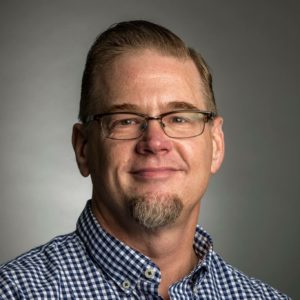 Meet Dan Hoffman – former clinical assistant professor of education of the deaf and hard of hearing (posted March 1, 2019)
Meet Dan Hoffman – former clinical assistant professor of education of the deaf and hard of hearing (posted March 1, 2019)
Where did you live prior to coming to the University of Tennessee, Knoxville (UTK)?
I was born in Ohio. I was there until I was a teenager, and then we moved to Florida. I was there for most of my life. I was at a university in Utah for six years before I moved here.
What brought you to UTK?
It was just a perfect time to move here. I can be closer to my family. My daughter is in a neighboring state, and my mother is also in a nearby state, so they are right around Tennessee. When we lived out west, Utah was really far, so traveling was a bit more difficult. Finally, we have three younger grandchildren, and we felt like it was the time to be closer to family.
What is your role in TPTE?
I was hired as an American sign language (ASL) education coordinator for the graduate program. It hasn’t yet been established, but we’re planning to do that in the fall of 2019. It’s a new program that we’re setting up. We now have a deaf education program and an interpreting program, so this will be the third program. That’s one of the reasons why I was hired.
Right now, I am teaching various courses. I’m teaching ASL as a second language and deaf education courses, and there are some interpreting classes that I might be teaching. I’m also planning the graduate program. We’re waiting for accreditation for that to make it work. Hopefully we’ll be launching it in the fall. That’s our goal.
What led to you a career in your field?
I worked at the local post office for fourteen years. A good friend of mine was a professor at a community college and had a family emergency. He contacted me to substitute for him, so I taught during the afternoon and worked nights at the post office. I fell in love with teaching. It just changed my life. So I decided that I wanted to teach at the college level. I left the Post Office completely, and went back to college for twelve years straight. I got my bachelor’s degree, and then my master’s degree and finally my doctorate of education in 2014. I’ve been teaching at the university level for over ten years now.
What are some of ideas or resources that have influenced your teaching?
Technology. I’ve taught hybrid class models and online classes over the last five years, and those were really a different type of teaching. I’m also influenced by the ASL Teachers Association at the national level. They have conferences, and that is one of the best places to provide tools and information. It’s a great place to network, and where I can bring in new ideas to the classroom.
What are your research interests?
My dissertation focused on deaf adult literacy. It was called translanguaging. I was observing a deaf person’s signing skills and reading an English text, and then translating that to ASL. I’ve been looking at that to ask how they learn how to do that. Did they start that as a child? Did they figure it out own their own? Most deaf adults figure that out later. So that’s one thing I’m fascinated about and why I’m interested in deaf education and teaching young adults. Not teaching specific words, but teaching the language, their signs, and how to manipulate the language, and how do we look at an English sentence and change that to an ASL sentence.
Translanguaging is really how students interact with each other and younger children. It’s about watching the teacher teach, then watching the students figure it out, explaining it to each other in their own words and going back to connect it to what the teacher had been teaching. Some people might be resistant to the idea, saying that it’s “bilingual” or “dual language,” but translanguaging started about ten years ago in England and other countries, not only in America. It’s starting to spread, and it’s pretty interesting.
The framework is Jim Cumming’s Threshold Hypothesis. Students learn their first language in their home language, then they learn a second language with less difficulty because they already have a strong foundation with their first language, and it’s easier to learn a second language after that. It’s the same idea with deaf people. If they already have a good foundation in ASL, and they start as a child, then they can grow up to learn English more easily, like myself. Some deaf children don’t get appropriate instruction toward language development, so later on they struggle with their language. And then trying to learn a second language is even harder. So, I’m really fascinated with that.
What has been your favorite part about being a UT faculty member so far?
Well, it’s orange everywhere! That was my first impression…just “Wow!” TPTE people are wonderful. Meeting everybody has been really wonderful. And I really love this program. There are a lot of discussions and visions that have been going on before I got here, and I’m having to keep up and learn the new system. Also, my vision is similar to UT’s vision. I want to help students be academically successful. That’s my motivation.
“By the numbers”
50: Just recently, I finally touched all fifty states with my wife. The last state we visited was Hawaii. The best part was that we cruised around to all of the islands on a boat, and touched all of these different places.
07/07/07: The day we got married.
700: I’m a cyclist and I bicycled 700 miles from Virginia Beach to Chattanooga in ten days.
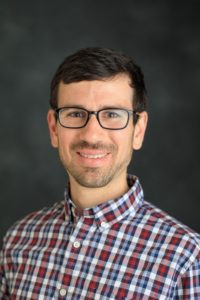 Meet Josh Rosenberg – assistant professor of STEM education (posted March 1, 2019)
Meet Josh Rosenberg – assistant professor of STEM education (posted March 1, 2019)
Where did you live prior to coming to the University of Tennessee, Knoxville (UTK)?
I grew up in West Bloomfield, Michigan. After college, I taught high school biology in Shelby, North Carolina. I had the opportunity to move back to Michigan, where I attended Michigan State University and lived in Lansing with my wife, Katie.
What led you to a career in your field?
While I was teaching in Shelby, I learned about how important good teaching is to students, especially to students with fewer opportunities than I was fortunate to have. As I was working on a master’s degree in education, I became interested in how the “context” was characterized in educational technology research. I thought it was not given very much attention, which meant that there was a chance to do research on how context affected how teachers and students used technology. I applied to and began my doctoral program at Michigan State University and started out doing research on context and teachers’ Technological Pedagogical Content Knowledge, or TPACK. During my assistantship, I started to work on a science education research project focused on engaging students in scientific and engineering practices. I kept my interest in the importance of context by using a research method, the experience sampling method (ESM), to study how learners engaged in scientific and engineering practices in a fine-grained way and how teachers supported this work. I was especially interested in how working with data as part of engaging in scientific and engineering practices can be empowering to learners. Collectively, these experiences led me to my research and teaching in STEM education.
What are some of ideas or resources that have influenced your teaching?
Pam Grossman and colleagues’ ideas about approximating the practices of teaching influenced how I plan for opportunities for future and in-service teachers to get started and to try out new kinds of teaching. Opportunities to try new teaching practices is especially important in the context of recent science education reform efforts, which call for new kinds of student learning that can be challenging – but also very rewarding – to enact and support.
Tell us about your role in TPTE.
I am an assistant professor of STEM education, with an emphasis on science education. I am interested in the role of educational technologies in STEM and science education.
What has been your favorite part about being a UT faculty member so far?
I like being a part of a department made up of scholars with so many areas of expertise. As I mentioned earlier in terms of what led me to a career in my field, I think of myself as a STEM education person. I value the chance to work with and learn from my new colleagues with expertise in STEM subject areas as well as those who work in areas that have a lot to say about how widespread opportunities for learners to be able to engage in STEM really are, such as my colleagues in English as a second language and urban / multicultural education.
“By the numbers”
5,110.8: I have been a bike commuter for the past three and a half years.That’s how many miles I have biked since I started tracking my rides using the Strava app! I’m interested in how learners work with data in science, and I am also interested in data.
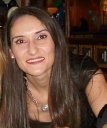 Meet Zoi A. Traga-Philippakos – assistant professor of literacy education (posted March 1, 2019)
Meet Zoi A. Traga-Philippakos – assistant professor of literacy education (posted March 1, 2019)
Where did you grow up, and what was that experience like?
I am from Sparta, Greece. From history this is known to be the valley of the warriors and has a great history. I grew up in a country where every stone that you’ll turn has historical importance. Generally in the culture, there is a sense of pride in everything you do or plan to do and a determination to do it well. You are proud of what you achieve. That was part of my consciousness along with that history growing up.
Was there something in that upbringing that inspired you to teach, or toward education in general?
In our family, we are educators, so I think that was one of the reasons. I wasn’t planning to become an educator, but I liked being one, and I enjoyed working with adults and children. I always enjoyed learning with and from others. Working as a teacher and an administrator in my country and later as a teacher and a literacy coach in the United States, I saw the challenges of teaching, especially working on the administrator’s’ side. I understood more about policy and its demands, not just about evidence-based practices and effective instruction.
What led you to higher education?
I worked as a teacher in the United States in addition to my work in Greece, and I felt a need to share knowledge and create knowledge that was making a difference. I’m devoted 100% to making a difference in a child’s life and in a teacher’s experience. If I manage to do this, then my role in life has been fulfilled. I want to create opportunities for every child to succeed in higher education. Education is not just getting a degree. It’s not an achievement point. It’s not a privilege. All children should have the right to educate themselves, to see the world in a different way. I want children to have choices in their adult life.
As an assistant professor in literacy education, you already have an extensive background in research. What factors have led to your robust research agenda?
Perhaps it is because I had the ability to work early on from my bachelor’s degree with people who were strong researchers, and I developed knowledge of quantitative research. In my master’s program, I worked with Charles “Skip” MacArthur from the University of Delaware. I fell in love with the process of asking questions in writing research. The reading and writing connections interested me, and the way that the two are not as separate as they are found in the curriculum. I saw that writing is not really a literacy task – it is a critical thinking task that is applicable across the curriculum. So it is not a box within English / language arts time; it should be across the day so that students have multiple opportunities to write for different audiences and for different purposes.
In 2015, I worked as a post-doctoral project manager to write a grant proposal that focused on the development of a curriculum for a community college writing course. I co-wrote the curriculum and the grant was awarded in 2016. The goal now is to scale up to see how the curriculum we developed works across different environments, different states, and different community colleges. We are on our third year of that.
When I was in the post-doctoral position, I authored a book on genre-based strategy instruction for grades 3-5 with Skip MacArthur and David Coker. In schools, where they applied this approach and where they gave students opportunities to write across the curriculum, the growth was tremendous. People began to ask, “How can we make this project bigger?” That’s what led us to writing a grant to develop a professional development model for genre-based strategy instruction. In the meantime, we were motivated by schools and districts that applied the 3-5 program to address K-2 learners. So, since 2015, we have been developing the curriculum for K-2. We have the research to say that these work, and now we have a publication and book coming up for grades K-2 in addition to grades 3-5.
I’m also continuing the development of the curriculum for middle schools. This semester, I have two middle schools that are going through the process of design research. Data will be collected from English / language arts, science, and social studies. They’ll all receive the same type of instruction and the same type of resources, but the differentiation will be on the application of the writing genres depending on the discipline. This is a new development for me, so maybe I’ll find some things that don’t work. That is the beauty of design-based research! You think things will work one way, and then you find out they don’t. And in this process teachers are collaborators! I find this a needed step prior to experimental studies in interventions.
“By the Numbers”
26.2: I have run two marathons in Greece. One of those was a marathon around Sparta. I was teaching during that time, and I had told the parents and students that all of us would go together, and we would represent our school. They came and we all ran. We registered by age, and I didn’t know that you win by age. At the very end, we celebrated together because I always built community and try to connect with community. The next day, I received a call that I needed to go to the office to pick up my medal. And I thought ,“For what?” I went and found out that I had won for my age group!
4: I have walked to the top of the Monemvasia Castle seven times, and I will try to do so for as many as I can.
I have walked to the top of the Mystras castle (top of second gate from the first gate) more than ten times, and I will continue for as long as I can.
Written by Joan Grim, senior lecturer, special education
Meet Frances Harper, assistant professor of STEM education / math (posted March 1, 2019)
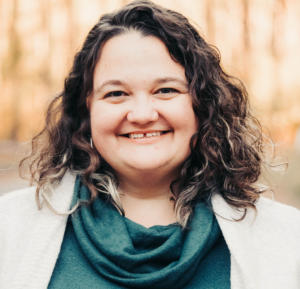 Assistant Professor of science, technology, engineering, and math (STEM) education / math, Frances Harper, has multiplied student and family engagement in math through her outreach efforts.
Assistant Professor of science, technology, engineering, and math (STEM) education / math, Frances Harper, has multiplied student and family engagement in math through her outreach efforts.
Since starting your career in Knoxville, what has inspired you to reach out in the community to encourage out-of-school experiences in math?
My motivation for encouraging out-of-school experiences in mathematics is twofold: (1) to support the development of the teacher candidates that I work with and (2) to create opportunities for students who are often marginalized in mathematics to see themselves as capable learners and doers of mathematics.
Working directly with students provides teacher candidates valuable learning opportunities to develop their mathematics teaching, but the high stakes nature of school mathematics can make it challenging for teacher candidates to be creative and innovative in their school-based experiences. My goal is to prepare teacher candidates for innovative and effective mathematics teaching by giving them an opportunity to use what they are learning in my mathematics methods courses in an alternative learning space to bridge school mathematics content with the ways in which children use and experience mathematics in the community.
My work with teacher candidates indirectly creates opportunities for students, who are typically marginalized, to see themselves as capable in mathematics, but I am also motivated to partner directly with families (parents/guardians and children) to support increased opportunity for mathematics engagement. Mathematics, more so than other subjects, serves as a gatekeeper for STEM pathways, with many students avoiding or abandoning STEM tracks because of mathematics requirements.
Parents and guardians play an important role in supporting children’s opportunities for mathematics learning, but researchers and educators often overlook the ways that Black and Brown families from low-income backgrounds deliberately advocate for and support their children’s education. My goal in partnering with families is to better understand the ways they already advocate for their children in mathematics and to offer access to findings from mathematics education research that they find helpful in more effectively acting as intellectual resources for their children in mathematics.
What kinds of programs have you designed and implanted?
The most established program is a partnership between teacher candidates enrolled in my mathematics methods courses, the East TN STEM Hub, and local preschools and elementary schools. I received a Community Engagement Incentive Grant for 2018-2019 to design and enact this program. As part of a major course project, teacher candidates in my courses visit a local community surrounding a designated school and learn from conversations with community members. The purpose of engaging with the local community is to recognize ways in which mathematics and other STEM disciplines are integral parts of children’s and families’ daily lives. Teacher candidates identify resources from the local community that they can use to support children’s mathematics learning, and they leverage these resources to design an activity for a family STEM night at the designated school. The East TN STEM Hub works with local schools to coordinate these events, and provides some additional materials for the activities. The teacher candidates facilitate their activity with children and families who bring a range of mathematics experiences and backgrounds. This experience helps teacher candidates to recognize that all people are capable of doing challenging mathematics work when it is relevant to their lived experiences. You can see examples of activities teacher candidates have designed here.
What are some upcoming programs that you will be leading?
I am excited about a new program that is beginning this Fall with support from an Engagement and Outreach Mini-grant. The goal of this project is to support Black and Brown parents and guardians from low-income backgrounds to act, more effectively, as intellectual resources in their children’s mathematics education. I am currently developing and will implement three workshops designed to address the unique challenges that Black and Brown families from low-income backgrounds face to involvement in mathematics education. Each workshop will draw on the research base in mathematics education and make important findings about equitable mathematics teaching and learning for Black and Brown children accessible to parents and guardians of those children. The emphasis of each workshop is designed to develop practices shown to foster more effective parental involvement among Black and Brown families and higher mathematics achievement for Black and Brown children. The first workshop will focus on navigating the school mathematics curriculum. This will include understanding why new school mathematics curricula incorporate approaches to problem solving that are unfamiliar to parents and guardians and the importance of conceptual understanding for procedural fluency in mathematics. The second workshop will focus on supporting mathematics learning at home and in the community by leveraging community-based and cultural ways of knowing and doing mathematics. Finally, the third workshop will focus on the impact of stereotypes on children’s opportunities to learn mathematics and ways that families can challenge and navigate those stereotypes.
What roles do graduate students have in these programs?
Because most of the teacher candidates that I work with are also master’s candidates, graduate students play a direct role in the family STEM night program by designing and facilitating activities. I have also worked with two fabulous doctoral students on the family STEM night program, Nick Kim and Zach Stumbo, to do research on what kinds of learning opportunities the family STEM night experience creates for the teacher candidates. Nick and I will be presenting some initial findings at the American Educational Research Association (AERA) Conference in February 2020, and the three of us are waiting to hear back about two papers related to this work that we submitted for AERA 2020. Zach Stumbo worked with me last year to help guide teacher candidates to design and plan for their activities, and he’ll be continuing in that role this year as well as helping me get the new program for families up and running.
Can you share a story about the lived impact of your program?
I’ll share a little about one activity that teacher candidates designed that I think illustrates how the experience helps them to understand ways to make mathematics accessible to every child. In fall 2018, a group of teacher candidates decided they wanted to design an activity to connect to Fair Garden Preschool’s “Fall Festival” theme for the family STEM night. By visiting the community, the teacher candidates noticed several places near the school where families could buy pumpkins. Building on children’s experiences with pumpkins, they developed an activity that asked students to answer, “Which pumpkin is fattest?” From a group of pumpkins, children could measure the pumpkins in different ways (circumference, diameter, weight, etc.) and make a mathematical case for how they decided “fattest”. The idea of “bigness” naturally prompts quantitative reasoning, but the way it is quantified is open to interpretation. Some students measured the circumference of each pumpkin using measuring tape or string and a ruler, but other students used the physical pumpkins to compare “fatness”. Some students even explored “pumpkin pi” by comparing the circumference of each pumpkin to its diameter and noticing the pattern (it is always approximately 3). This activity gave every child, regardless of mathematics background or experience, an opportunity to reason quantitatively and construct a mathematical argument. You can see more details about the activity here.
TPTE Staff Spotlights
Meet Heather Davis, Theory and Practice in Teacher Education (TPTE) administrative specialist (posted March 1, 2019)
Although Heather Davis is a new support staff member of TPTE, she is not new to to the University of Tennessee, Knoxville (UTK). Heather earned her undergraduate degree in political science and economics at UTK. In 2015, she returned to work in the Smart Communities Initiative before transitioning to an administrative specialist position in TPTE. During her time away from Tennessee, Heather was a communications manager and public affairs lead for NHS Health Scotland. This work led her to pursue her PhD in human geography and health inequalities at UT through an official co-chairship with the health inequalities board of Scotland.
Heather’s position in TPTE capitalizes on her educational background and work experience in communications. Her master’s degree in contemporary communications from the University of Notre Dame of Maryland and her vast experience with the national health service in Scotland have provided her with an extensive background for promoting the highlights and events of TPTE faculty, staff, and students through newsletters, social media, and other venues.
When asked about the aspects about TPTE that she likes the most, Heather quickly identified two: the people and the focus on education. “There is such a high level of collegiality here,” she remarked. “Everyone is so supportive of one another.” A second aspect was the focus on education. With an office just across the hall from BEC 428, a frequently-used classroom, Heather described how she often hears conversations and lectures during instruction. “I love hearing about how faculty are teaching teachers about working with young people,” she noted.
Three fun facts about Heather:
- She has dual citizenship with the US and the UK
- She is a first-generation college student
- Her PhD committee includes both UT faculty members and public health representatives from Scotland
TPTE Current Graduate Students
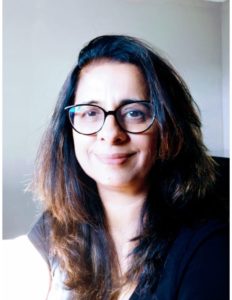
Meet Indrani Singh – doctoral student in teacher education (posted November 1, 2019)
Indrani Singh is a first-year doctoral student in Theory & Practice in Teacher Education. Prior to joining the program, she served as a teacher and PK-12 school principal for 12 years in India. Overall, she brings 27 years of experience to her doctoral studies.
When considering doctoral programs, Indrani had many decisions to make including location, programs offered, and doctoral student opportunities. She ultimately chose the teacher education program at University of Tennessee, Knoxville over other institutions because of what she noted as its nationally renowned faculty, its commitment to making the highest quality program available to educators along with rich opportunities to develop academically and professionally, and the excellent services offered to the students around the clock.
Even though Indrani has only recently begun her work in TPTE, she is already busy with coursework and research projects. In fact, she is currently working on a project with Anthony Pellegrino, associate professor of social science education, comparing the evolution of educator preparation in India and the United States, writing a paper on effective comprehension strategies for struggling readers at the elementary level, and writing a book review of clinical experiences in teacher education.
The experience of working closely with her TPTE colleagues and experiencing other diverse cultures have been the best parts of being a doctoral student in the department of TPTE so far.
TPTE Alumni Spotlights
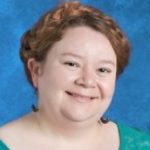 Meet Beth Nelson (’05) – alumnus, former master’s student in Teacher Education (posted September 24, 2019)
Meet Beth Nelson (’05) – alumnus, former master’s student in Teacher Education (posted September 24, 2019)
The Importance of Mentoring for Teacher Candidates: A Few Words from Beth
Written by Anthony Pellegrino, associate professor of social science education.
For Fulton High School teacher, Beth Nelson, teaching and mentorship go hand-in-hand. She draws on her experiences as a teacher candidate and teacher to support University of Tennessee, Knoxville interns who are fortunate enough to work at Fulton. For this spotlight, we asked Beth a little about her background and what draws to the work of mentoring.
Tell us about your UT background. What was your program?
I earned my bachelor’s of English from Sewanee: The University of the South, and while I was there I took a few classes in education. I decided I wanted a year-long internship rather than a shorter student teacher experience, so I applied for the Professional Development Schools (PDS) program at UT. It was geared towards students who wanted to teach in urban schools, and our cohort in the program was exclusively at Fulton and West High Schools. As part of the program, all the interns in the program, regardless of content area, took classes together at the high schools instead of on campus. Unfortunately, the program lost funding a few years after I graduated.
What was your internship experience like as a teacher candidate?
It was intense. I remember feeling completely overwhelmed at various points in the year, but luckily, Fulton took the task of mentoring interns very seriously, and everyone on staff was willing to pitch in and help. You knew that you could ask any staff member in the building for assistance, and if they could not help, they would find someone who could. We were always treated as important members of the staff. In fact, during my internship, I was a member of Fulton’s Mentoring Core Team as a representative for interns and new teachers and held a role on that committee until it was dissolved during Fulton’s redesign process. I also had the privilege of interning with John Sides, who teaches at Hardin Valley, and Lara Charbonnet, who is an administrator at Colliersville High School outside of Memphis. Their support and companionship that year was invaluable.
What positions have you held prior to your current role at Fulton?
I interned at Fulton and I’ve never left, so I’m starting my 16th year as an English teacher there. I have mentored somewhere between nine and ten interns and student teachers over the years, and have held roles on various committees such as leadership team, was a building level tech coordinator (BLTC), and a team leader for our small learning community (SLC).
What is your current role at Fulton?
I still teach junior and senior English, as well as film studies, and starting in 2018-2019, I have been acting as Fulton’s intern coordinator. During my time as an intern, we had a retired teacher, Linnie McMillan who was hired by the PDS program to act as an intermediary between UT and Fulton. She was an extra layer of support for both interns and mentors, and she was a huge help to us in the program. In the spring of 2018, I felt that there had really developed a gap in communication between our school and UT, and that the interns were suffering for it. So with the support of my principal at the time, Rob Speas, we created this position as a way to help build that relationship back up. We also felt that interns had become an afterthought at Fulton over the years; that, departmently, we were doing fine, and everyone on staff was still kind and supportive, but there was a lack of cohesion across the school for expectations and that support. We want to model ourselves on a teaching hospital. Our number one goal is helping the students of course, but a major part of our mission is helping grow the next generation of our profession. So my job is to make sure everyone is on the same page and that our interns and mentors get the support they need.
What do you want to see from your Fulton interns? How do you define/see success?
We want professionals who are able to reflect on their teacher practice and recalibrate as needed. I know an intern is ready for her own classes when she feels confident in front of students, but she is still willing to look at ways to improve. And I also want interns who understand how to be warm demanders; they should understand what it means to teach large populations of students with trauma in their lives, but that does not mean we don’t expect their best. It’s a fine line to walk, and it may take someone their entire career to get there, but a successful intern is eager to take that on.
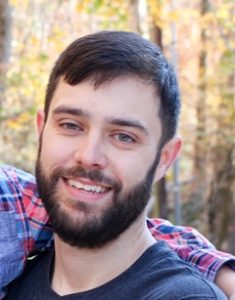 Meet Michael Hartman (’06, 09) – alumnus, former master’s student in teacher education (posted September 24, 2019)
Meet Michael Hartman (’06, 09) – alumnus, former master’s student in teacher education (posted September 24, 2019)
From intern to mentor
Written by Kristin Rearden, clinical professor of science, technology, engineering and math (STEM) / science education
Michael Hartman (’06, 09) is one of many former University of Tennessee, Knoxville teaching interns who now gives back to the profession by serving as a mentor to future teachers. His career path shows the impact that one teacher can make on a student, even if that impact takes years to manifest. He credits his choice for a career in secondary science teaching in part to one of his own high school science teachers, Lauren Harper-Lott. Hartman noted that Harper-Lott, a 2017-18 SCORE Teacher Educator Fellow, clearly had passion for her subject and for her students. “She really inspired me to be interested in science and the natural curiosity that science brings to the world,” stated Hartman. A second source of inspiration for his teaching career came from his work as a camp counselor for the Boy Scouts of America. His work as a counselor confirmed for him that he had an innate ability to teach. While earning his undergraduate degree in both biochemistry and cellular and molecular biology at UTK, Hartman decided to blend his dual interests in science and teaching, and pursue a career about which he could be truly passionate.
Hartman looked back on his time as teacher candidate with great enthusiasm and appreciation. “Without a doubt, my best experience was my internship at Hardin Valley Academy,” noted Hartman. “I had three amazing mentors, and I would not be the teacher I am today without that experience.” He had the unique opportunity to be placed at a school which opened its doors for the first time during his internship. This resulted in some unforeseen challenges, such as starting the year without any science equipment. “We were told over and over that the equipment was coming. I learned a great deal about how to make science happen with nothing!” Hartman recalled. He also commented on the impact of a summer course he took with Claudia Melear, associate professor of science education, where they spent a week engaging in authentic science learning experiences on Skidaway Island. “It was an amazing time to be able to see how you can teach in the natural setting,” he stated.
Since completing his internship at Hardin Valley Academy (HVA), Hartman has accumulated eleven more years of teaching experience there. He has taught students from 9th through 12th grades in physical world concepts, biology, and chemistry. In addition to serving as a mentor for four year-long UTK interns, he has also mentored student teachers from the Vols Teach program and interns from other teacher licensure programs. In reflecting on his experiences as a mentor, Hartman highlighted the benefits to both the mentor and mentee. “Being a mentor allows you to improve your own teaching. Having to teach someone how to teach makes you take a deeper look at effective practices,” he noted. One lesson he’s learned over time is that teacher candidates are working on finding their own style and will struggle along the way. “They are not a mini version of you. It’s hard sometimes to watch them struggle and not do something the way you would do it, but it will give you the chance to learn too.”
With his twelve years of teaching experience, Hartman has seen many changes in education. He considers the adoption of the new Tennessee Academic Standards in science to be one of the most positive changes during that time. “I have always believed that science is a verb, and students should be engaged and practicing science in the classroom,” he reflected. “Now with the three dimensional aspects of the standards, students are active participants in their own learning.” Hartman’s impact on science education both locally and statewide are apparent. He has served as Hardin Valley Academy’s science department chair since 2014, and was honored as the HVA Teacher of the Year in 2015. Additionally, he has contributed to the state’s revisions of science academic standards, including being part of the team that wrote standards for physical science and a reviewer for the TN Ready test in biology. His career in education truly exemplifies how one teacher can make a significant impact, and how giving back to the profession through mentoring makes the teaching profession even stronger
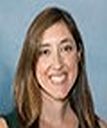 Meet Sara Demoiny (’17) – alumnus, former doctoral candidate in teacher education (posted March 1, 2019)
Meet Sara Demoiny (’17) – alumnus, former doctoral candidate in teacher education (posted March 1, 2019)
What was your major / program?
My doctoral studies were in Theory and Practice in Teacher Education (TPTE) teacher education with a specialization in social science education.
What was your favorite / most impactful class?
Although all of my courses had some impact on me in terms of content, teaching style, and dialogue, the most influential courses were my methodology courses. Introduction to Qualitative Research and Advance Qualitative Research were both challenging. In these classes, I constantly had to think critically, defend my opinions, and continuously write. I feel like I learned how to write well in these courses with Lauren Moret, assistant professor in educational psychology. I also discovered that I am a qualitative researcher, and I have earned a Qualitative Research in Education Graduate Certificate.
What most interested you in your program / research?
When I entered the doctoral program, I had no intention of working in a university setting where research would be a significant part of my responsibilities. Through this program, I learned so much about myself professionally. It opened my eyes to the fact that I like to research. I like to write. Each course helped to build my confidence as a novice researcher in the field.
What piece of advice would you give to a new student entering the teacher education program?
It is difficult to share just a few pieces of advice because I learned so much in this experience, but I would advise: 1) Say “yes.” Take advantage of opportunities to collaborate with professors and to serve on committees. 2) Once you have determined a topic that interests you, try to make all of your writing assignments about that topic. I focused on race in social studies education, and by the time, I came to write my literature review, I pretty much had the research completed. 3) Create a system to keep track of every article you read. I used an Excel spreadsheet for different topics. For each article I read about the specified topic, I listed the American Psychological Association (APA) citation, summary of the article, quotes I used from the article, and any connections I made to my work.
Extras:
Earning a doctoral degree is a transformative experience. You will begin to view the world differently and more deeply understand your worldview.
Dissertation topic:
Living the change they seek: social studies teacher educators who incorporate race into the curriculum
Future plans:
I am now an assistant professor of elementary education at Auburn University!
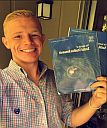 Meet Matt Hensley – alumnus, former doctoral candidate in social science education (posted March 1, 2019)
Meet Matt Hensley – alumnus, former doctoral candidate in social science education (posted March 1, 2019)
What made you decide to join the Theory and Practice in Teacher Education (TPTE) doctoral program, specializing in social science education?
I am finally living a dream of mine that I have had for as long as I can remember! It’s always been my ambition to earn a doctorate; however, I originally never really knew what I wanted that doctorate to be in. Coming from a political science background, I have always had a passion for promoting youth political and civic engagement. As I progressed through my undergraduate career, I came to realize that the genesis of producing well-rounded, politically knowledgeable and active citizens is truly found in the classroom where passionate educators are willing to “push the envelope” and try alternative practices to make the content as relevant as possible. In a nutshell, this is how I wound up in the education research world. Being in the master’s program prior to this sparked a love for the content, the pedagogy and what the education research is striving to do in general for both students and educators. Earning my PhD, I believe, will give me the opportunity to gain a deeper understanding of the profession and prepare me to conduct my own purposeful research to contribute to a field that is constantly in flux!
What has it been like to be a new doctoral student?
It’s been a new overwhelming feeling, but in a good way. I feel like everything I do is purposeful and meaningful. I feel like everything, every class that I’m in is focused on preparing me to be excellent at whatever I decide to end up researching. And then mixing that with my unique assistantship at the McClung Museum, where I’m depended upon to use my previous education experiences to produce quality lessons and curriculum on a regular basis, I truly feel like a professional. I realize I’m still a student, but when I have conversations with professors, the conversations feel more like we’re collaborating together to try to solve the greater issues that are out there in the education world through my assignments. I feel like everything is strangely coalescing to pave the way for me to delve deeper into my own research interests in the future. It was surprising.
What has been the most exciting thing you’ve learned so far?
I am coming to find more about where I stand on particular issues and who I am as a future researcher. It’s becoming more and more evident, the more I dig into research, I find that I align with certain principles, certain paradigms which is giving me more explanation of who I am. It’s starting to makes sense. I’ve always had these feelings and thoughts about approaching issues or research, and now it’s been particularly interesting to discover where the root of these instincts and feelings are coming from. I’m also excited that I’m able to see things in a whole new perspective when it comes to research. I feel like I originally (before starting the program) had a more narrow view of things, but now, the more I read the literature, and engage in dialogue with professors and colleagues, I’m more open to new experiences and taking a more in-depth look at issues, while being aware of my own personal biases!
What are your goals after you finish your doctorate? What do you hope / expect your degree will allow you to do that you couldn’t do otherwise?
I would really love to work at an research one (R1) institution and conduct my own research studies and really just make a difference in teacher education, particularly social studies teacher education and professional development. A new research interest of mine lately has been teacher professional development. I love writing and researching alternative / best practices of teaching social studies. I am extremely passionate about providing teachers with the most efficient, effective, pedagogical practices to make social studies content engaging and fun for students and educators.
What is your role at McClung Museum?
Essentially, I am an assistant to the curator of education. I assist her and part of what I do is help to develop curriculum and lesson plans that directly or indirectly link content at museum to Common Core State Standards (CCSS) in social studies science and art. So, it’s not just the social studies realm. That’s the biggest part that I work on. We also work on programming and creating professional development workshops for teachers in the community and surrounding counties to come out and learn how to better facilitate object-based learning, which is extremely beneficial. I’m able to offer insights on that. I never really used true object-based learning where I brought in materials, but I did a lot of station activities, gallery walks and such, so I’m able to help out a lot there. I also do a heavy amount of research for upcoming galleries and existing galleries. We’re constantly trying to learn new information just so we can give the most up to date and holistic information to the people that come to visit.
What have you learned in this role?
I’ve learned that museums are really “hopping” places, which I think might be surprising to the general public and educators. Museums are very fast-paced working environments in that we are constantly researching and learning new information about permanent exhibits, as well as temporary exhibits. There is so much work that goes on behind the scenes, from event programming, curriculum creation, tours, academic / professional events, public relations, not to mention, (the most important part) housing and maintaining the historical artifacts. The list is endless. I have learned that the McClung, in particular, is a great academic resource, especially for P-12 educators. Moreover, I have learned that there can be political issues particularly when it comes to housing artifacts. For example, in our Native Peoples of Tennessee gallery, we have a few artifacts on display that might be taken down due to tribal claim. This is extremely interesting because the tribe believes that the artifacts should be returned to their original location of excavation. Museum staff believe they are preserving the objects in a safe environment where they can be honored and maintained.
You stay very busy with classes and your work at the McClung, but what do you like to do outside of work and school?
I am an avid runner! I also love to swim and hike in the Smokies. I also love to play the piano and sing. I am also very involved with Destination Imagination.
